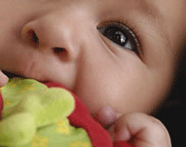Teething

Recognizing when your baby has started teething – and how to help them through it
Teething can start as early as three months but typically starts between four and seven months. It will continue until a child’s third birthday.
Who’s first?
- The first teeth to appear are usually the two bottom front teeth, also known as the central incisors.
- These are usually followed 4 to 8 weeks later by the four front upper teeth (central and lateral incisors).
- About 1 month later, the lower lateral incisors (the two teeth flanking the bottom front teeth) will appear.
- Next to break through the gum line are the first molars (the back teeth used for grinding food), then finally the eyeteeth (the pointy teeth in the upper jaw).
- Most children have all 20 of their primary teeth by their third birthday.
- These are general guidelines – if your child experiences significant delay, speak to your child’s doctor.
Tell-tale signs that your baby is teething
- Drooling:
It will seem like someone left a faucet on inside your baby’s mouth. He will probably sputter a lot. - Drool Rash:
As the baby’s skin is sensitive, the constant drool of saliva could cause a red, harmless rash around the lips and cheeks. - Diarrhea: Teething can cause a little bit of diarrhea, which could lead to diaper rash.
- Bulging Gums:
You will notice the outline of the teeth under the surface of the gums. - Little Vampires:
Baby will bite and chew on everything including fingers, toys, necks and breasts. - Crankiness:Most babies will be irratable and hard to please.
- Coughing:
The excess saliva can cause the baby to cough and gag. - Fever:
It’s very common for teething to be accompanied by low grade fever. - Ears:Often a baby will rub or pull on his ears.
Teething is a normal developmental process in which the first set of teeth, called primary teeth, break through the gums. During this period, your baby will be experiencing some pain and discomfort, so be prepared to lose a few hours of sleep. Don’t stress though, it’s not all bad. Here are some tips that will help you and your baby:
- Wipe your baby’s face often with a cloth to remove the drool and prevent rashes from developing.
- Place a clean, flat cloth under the baby’s head during sleep to catch the drool therefore you’ll only have to change the cloth when it gets wet, not the whole bed sheet.
- Give your baby something hard to chew on. Make sure it’s big enough so as not to swallow and strong enough so it can’t break into small pieces. Try a rubber teething ring that can be cooled in the fridge, but avoid the liquid ones because they may break. Be sure to take it out of the freezer before it becomes rock hard – you don’t want to bruise those already swollen gums! Never tie a teething ring around a baby’s neck, as it could get caught on something and strangle the baby.
- Rub your baby’s gums with a clean finger, a small cool spoon or wet gauze
- Try Acetaminophen (Tylenol) or Ibuprofen (Advil)-these are both safe and effective pain relievers.
- This may well give you a few hours extra sleep. Never place an aspirin against the tooth, and don’t rub whiskey on your baby’s gums.
- Teething gels such as Ambusol and Orajel containing local anesthetics can provide some pain relief by numbing the gums. Only use as last resort as they taste bad, they can numb the tongue and lips, and it’s easy to use too much and therefore the baby can swallow it.
Dental Hygiene-Start’em young
Even though your child’s first set of teeth will fall out, it is still very important to keep the teeth clean. Dental care should begin immediately. Wipe gums daily with a damp cloth or with a baby-sized toothbrush, with no toothpaste. You shouldn’t really use toothpaste on a child until they can spit it out, around 3 years old, as fluoride can affect a child’s health. Brush at least twice a day or after meals. Flossing is also vital when two teeth start growing beside each other. A good idea to get the child interested is by letting him/her imitate you as you floss and brush. Visit a dentist regularly to get your child accustomed to visiting the dental office.



